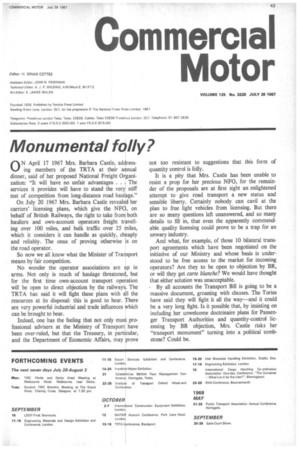Monumental f Ily?
Page 45

If you've noticed an error in this article please click here to report it so we can fix it.
ON April 17 1967 Mrs. Barbara Castle, ads essing members of the TRTA at their a nual dinner, said of her proposed National Freight 0 ani
zation: "It will have no unfair advantages . The services it provides will have to stand the ver stiff test of competition from long-distance road haul ge."
On July 20 1967 Mrs. Barbara Castle reveal her carriers' licensing plans, which give the NF , on behalf of British Railways, the right to take fro both hauliers and own-account operators freight tr yelling over 100 miles, and bulk traffic over 25 i iles, which it considers it can handle as quickly, ch aply and reliably. The onus of proving otherwise s on the road operator.
So now we all know what the Minister of Tra sport means by fair competition.
No wonder the operator associations are p in arms. Not only is much of haulage threatene , but for the first time own-account transport opel ation will be open to direct objection by the railway . The TRTA has said it will fight these plans with 1 the resources at its disposal: this is good to hear. I here are very powerful industrial and trade influences hich can be brought to bear.
Indeed, one has the feeling that not only mus fessional advisers at the Ministry of Transport been over-ruled, but that the Treasury, in part' and the Department of Economic Affairs, may not too resistant to suggestions that this form of quantity control is folly.
It is a pity that Mrs. Castle has been unable to resist a prop for her precious NFO, for the remainder of the proposals are at first sight an enlightened attempt to give road transport a new status and sensible liberty. Certainly nobody can cavil at the plan to free light vehicles from licensing. But there are so many questions left unanswered, and so many details to fill in, that even the apparently commendable quality licensing could prove to be a trap for an unwary industry.
And what, for example, of those 10 bilateral transport agreements which have been negotiated on the initiative of our Ministry and whose basis is understood to be free access to the market for incoming operators? Are they to be open to objection by BR, or will they get carte blanche? We would have thought that either solution was unacceptable.
By all accounts the Transport Bill is going to be a massive document, groaning with clauses. The Tories have said they will fight it all the way—and it could be a very long fight. Is it possible that, by insisting on including her unwelcome doctrinaire plans for Passen pro-ger Transport Authorities and quantity-control lic have ensing by BR objection, Mrs. Castle risks her ular, "transport monument" turning into a political tomb • rove stone? Could be.




































































































































































